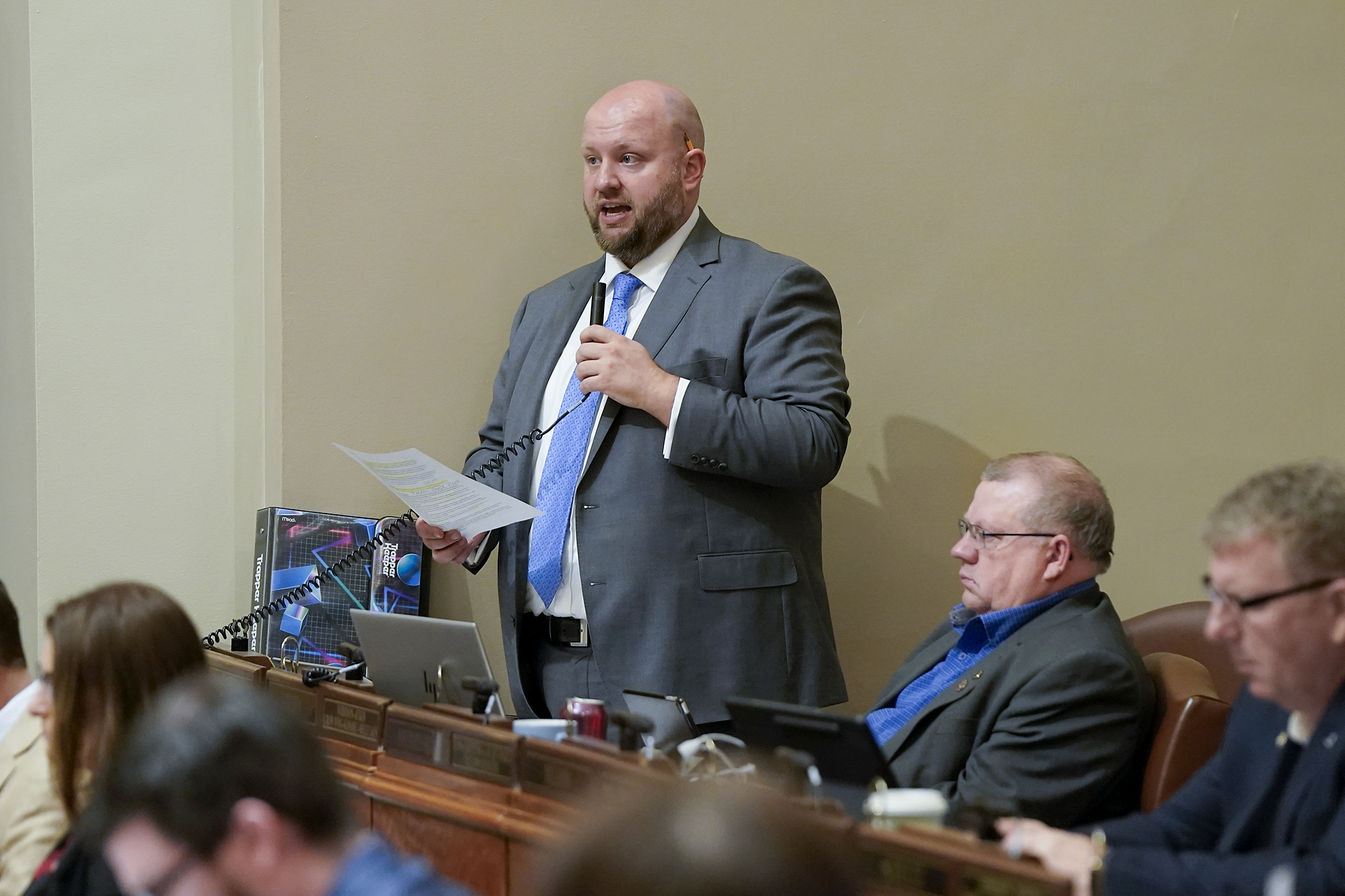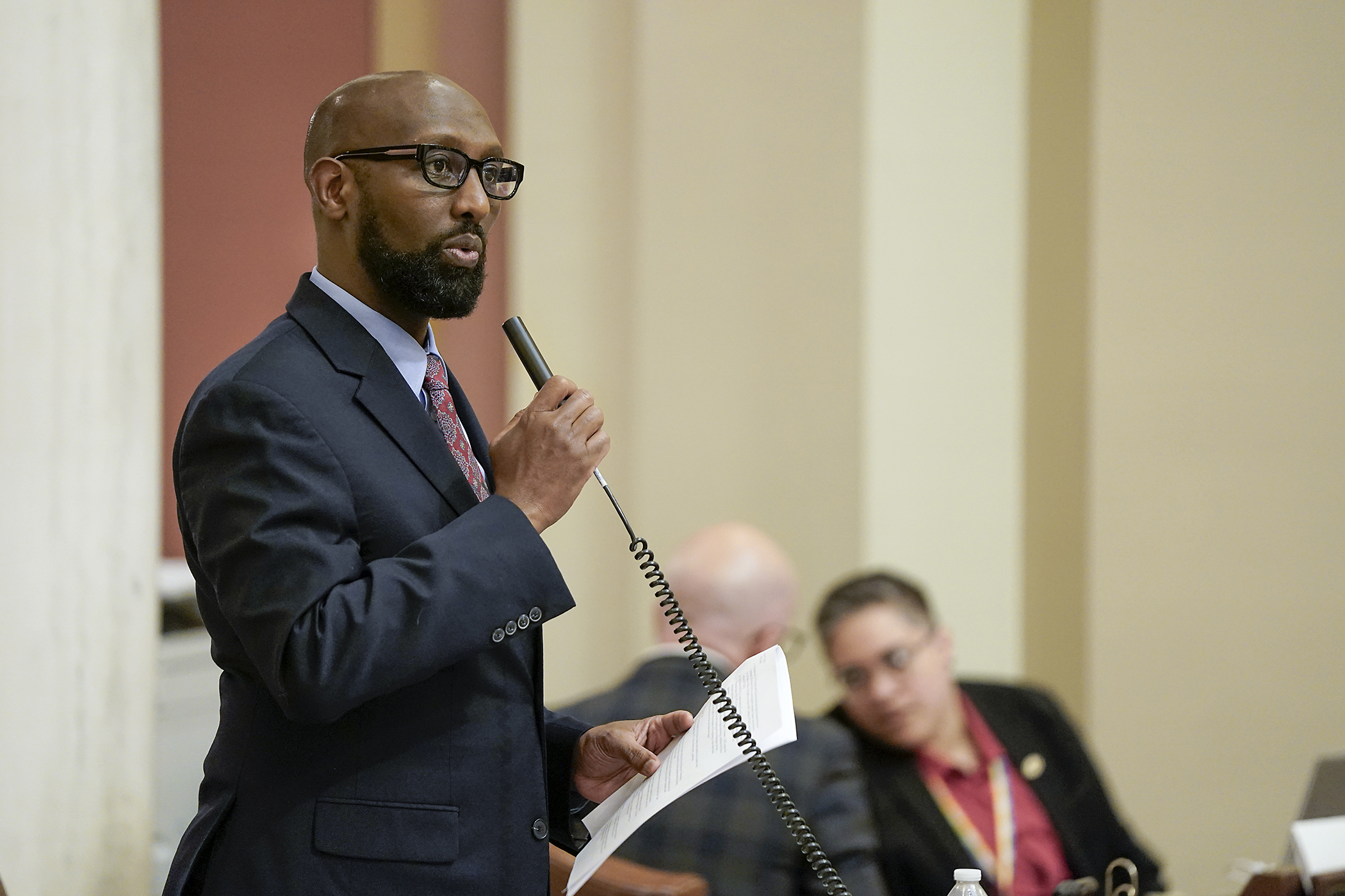House passes human services budget bill proposing deep cuts

The human services budget is taking the biggest hit this session.
With the second largest budget in state government and a looming deficit on the horizon, human services was in the crosshairs for deep cuts this session.
Tasked by House leaders with cutting $300 million in 2026-27 biennial spending, the choices made in HF2434 don’t make everyone happy.
Despite those reservations, the $18.54 billion omnibus human services finance bill, as amended, was passed 109-25 by the House and sent to the Senate.
“We were tasked with a target of $1.3 billion in reductions over the next four years,” said Rep. Joe Schomacker (R-Luverne), the bill sponsor and co-chair of the House Human Services Finance and Policy Committee. “We were able to accomplish that in the bill that we have today. A balanced, workable budget for the future.”
Rep. Mohamud Noor (DFL-Mpls), the other committee co-chair, said this is “one of the most difficult bills” he’s helped create. “I know we've talked about the challenges and why some people are feeling the pain that we see here. This bill has got impact on vulnerable individuals, our seniors, people with disability, folks with mental health, substance use disorder and more.”
[MORE: Download the spreadsheet, governor's recommendations]
 Rep. Mohamud Noor discusses a provision in the omnibus human services finance bill on the House Floor May 5. He co-chairs the House Human Services Finance and Policy Committee. (Photo by Michele Jokinen)
Rep. Mohamud Noor discusses a provision in the omnibus human services finance bill on the House Floor May 5. He co-chairs the House Human Services Finance and Policy Committee. (Photo by Michele Jokinen)The biggest cut in the bill would be $427.09 million in long-term care waivers. Other cuts include $154.66 million to county share for rate exceptions, $75.34 million to reduce Disability Waiver Rate System growth, $73.16 million for nursing facility surcharge, and $66.76 million by removing the absence and utilization factor from Family Residential Services, Community Residential Services and Integrated Community Supports.
A disability waiver rate system inflation adjustment would save around $162 million.
The bill would reinstate Tax Equity and Fiscal Responsibility Act (TEFRA) parental fees for parents with income equal to or greater than 675% of the federal poverty guidelines and delay implementation of Waiver Reimagine until Jan. 1, 2028.
“This bill was very hard to read,” said Rep. Wayne Johnson (R-Cottage Grove). “Specifically, how once again, in order to get the work done down here, counties are turned to, to burden and take on the costs while we try to balance a budget down here and say we don't raise taxes, and we're doing our job. Citizens back at the county level are the ones taking the brunt because we know that this is gonna go back and this is gonna go directly to property taxes.”
On the positive side of the ledger, the bill would, in part, appropriate $102 million for a new direct care and treatment agency, $70.22 million for investments in community first services and supports, $20 million for a housing support supplemental rate bump, and $18.08 million to modify nursing facility payment rates.
[MORE: Human services panel reviews potential $300 million in budget cuts]
“Tough decisions had to be made,” said Rep. Steve Gander (R-East Grand Forks). “But when you're staring down the barrel of a $6 billion deficit looming in those out two years, four years, that's the kind of decision that had to happen. So we made it and we made it in the bipartisan fashion. Let's not forget that. We made it with limits that were set in the bipartisan fashion, we made it in a committee, in a bipartisan fashion.”
Workers get raises
Two segments of employees would get a raise: nursing home and disability services workers.
Nursing home workers would receive a $1.50 hourly raise beginning Jan. 1, 2027, because of new rules adopted by the Nursing Home Workforce Standards Board.
Disability services workers would get a 40-cent hourly raise starting Jan. 1, 2026, and another on Jan. 1, 2027, under a new contract with their union. A trust would be created, jointly operated by the state and the union under the State Board of Investment, for future bargained retirement contributions.
Amendments
Eleven amendments were offered with four being adopted, including allowing partnerships with schools, restaurants, and other community partners to provide meals for seniors, and MNChoices assessment updates.
Related Articles
Search Session Daily
Advanced Search OptionsPriority Dailies
Stable budget outlook projects $3.7 billion surplus now, no deficit in next biennium
By Lisa Kaczke The projected surplus for Fiscal Years 2026-27 is now higher than it was in the November estimate, and no deficit is projected for the next biennium.
“Minnesota’s budge...
The projected surplus for Fiscal Years 2026-27 is now higher than it was in the November estimate, and no deficit is projected for the next biennium.
“Minnesota’s budge...
Legislative leaders set 2026 committee deadlines
By Lisa Kaczke Legislative leaders on Tuesday officially set the timeline for getting bills through the committee process during the upcoming 2026 session.
Here are the three deadlines for...
Legislative leaders on Tuesday officially set the timeline for getting bills through the committee process during the upcoming 2026 session.
Here are the three deadlines for...